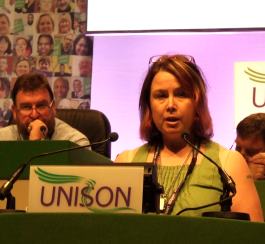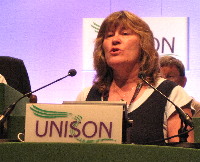 |
 |
||||||||||||||||||||||||||||||||||||||||||
|
|
Delegates heard of the difficulties which face members in the workplace who have non apparent disabilities, such as dyslexia or mental health problems. Conference committed the union to issuing information and guidance to both branches and employers to recognise the rights that these workers have under the Disability Discrimination Act and the Equality Duties and to survey attitudes towards and awareness of non apparent disabilities. Susan Kennedy told delegates of the work that Support for Learning members do to support pupils with non apparent disabilities in school. "We strive to enable our pupils to achieve to the best of their ability, from early years into young adulthood, and we see great success from the support they receive. "It is therefore incomprehensible to find that when they enter the workplace they are met with little or no support strategies," slammed Susan. "Employers have a responsibility to support and develop all their employees. It is therefore crucial that we insist that they are fully trained on the awareness of non apparent disabilities and resources made available to enable equal opportunities to all." Tackling domestic violence and holding perpetrators accountableUNISON will call for a statutory requirement in the public sector for workplace agreements to deal with the complex issues of domestic abuse and violence. These workplace policies should not only provide support for the victims of the abuse, but also provide procedures for dealing with the perpetrators.
Kate Ramsden, Aberdeenshire Branch said that domestic abuse crosses gender boundaries both in terms of those who perpetrate domestic violence and those who experience it, though the majority of those who experience it are women. She added, "We should remember that the victims of domestic abuse are not just those who experience it directly. We know that children who live in households where domestic violence takes place, or who witness it on a regular basis can also be significantly affected. "Those who perpetrate domestic abuse do so often as a result of their own life experiences. They too need support to confront and address their behaviour," she said, adding that we need a broad based approach to combat domestic violence including support for perpetrators to change their behaviour. Elaine Wishart, City of Edinburgh Branch, who moved the motion said, "The human cost of domestic abuse affects the whole of society and we all have a responsibility to challenge it. Unfortunately too many workplaces still view domestic abuse as a private matter, it is not. When our members are perpetrators, which they will be, we need to have appropriate measures in place to ensure they are held responsible and accountable for their behaviour." Elaine recommended the Refuge and Respect Toolkit as an invaluable resource for branches who seriously want to tackle domestic abuse as a workplace issue. Gray Allan, Falkirk Branch, explained that two women are killed every week in the UK by their partner or their ex partner and that 10 suicides every week are due to the experience of domestic violence, "Domestic violence will touch many UNISON victims, relatives, colleagues. Many perpetrators will also be UNISON members. They will interact with colleagues and supervisors. 44% will tell colleagues about their behaviour. We need Zero Tolerance. We still need a workplace procedure for perpetrators. Early intervention could save those two lives. Who's who?Every UNISON branch elects a delegation to attend annual conference and to vote on behalf of their local branch members. Scotland has about 200 delegates. This branch has three. Two must be women and one of these must be a low paid woman, to reflect the make-up of the branch. The Branch delegation to this year's Conference in Bournemouth is:
The SOC is responsible for the business of National Delegate Conference and for making sure that everyone at conference abides by the rules.
What's what?UNISON's annual national conference is the union's ruling body. Every year delegates from all over the country take part in debates to choose our campaigning priorities and policies. Conference is chaired by the UNISON National President, who this year is Gerry Gallagher, or by one of his Vice-Presidents. This year there are over 100 motions on the conference agenda and a number of proposed amendments to the UNISON rules. Only a proportion of motions will actually be debated at Conference because there is not time to hear them all. Motions are therefore "prioritised". Branch motions and amendments Each branch is also allowed to submit "amendments" to motions, to add to the motion or to change a part we don't agree with. They all add to the motions rather than changing them in any way. The branch has no amendments submitted this year. Motions are passed by a straight majority of the conference delegates on a hand vote. If it is close, conference delegates or the chair of conference can call for a card vote. The number of card votes per delegation is based on the number of members in the branch. Amendments to rule need to be approved by a two-thirds majority of the voting delegates. Card votes can also be called for (and often are) in rule changes. Thursday afternoon is traditionally the time that the rule changes are debated. Many delegates find this session really boring, but in recent years it has produced some of the best debates, and often the funniest speeches. As delegates we will vote on the motions and the rule changes in line with branch policy, where we have that in place and we can speak for or against any of the motions, amendments and rule changes, again in line with Branch policy, if we have a position. |
|
|||||||||||||||||||||||||||||||||||||||||







 We are very proud that Bob Revie, our Branch Secretary, is once
again Scotland's delegate to the The Standing Orders Committee
(SOC). He was nominated by a range of Scottish branches, including
ours and elected unopposed. This is Bob's third year on the SOC.
He took over from Robin Hunter who was our excellent Scottish
delegate for many years before, and who stood down for personal
reasons. Bob is doing a great job filling his boots.
We are very proud that Bob Revie, our Branch Secretary, is once
again Scotland's delegate to the The Standing Orders Committee
(SOC). He was nominated by a range of Scottish branches, including
ours and elected unopposed. This is Bob's third year on the SOC.
He took over from Robin Hunter who was our excellent Scottish
delegate for many years before, and who stood down for personal
reasons. Bob is doing a great job filling his boots. Kate,
as a member of UNISON Scotland's Communications and Campaigns
Committee, is also one of the three person team, that makes up
the UNISON Scotland Conference Briefing Team.The team issues briefings
throughout conference which keep Scottish delegates up to date
with UNISON Scotland's position on the debates and reports on
the week's business. The briefings have also been known to be
quite amusing and are sought after by many outwith the Scottish
delegations.
Kate,
as a member of UNISON Scotland's Communications and Campaigns
Committee, is also one of the three person team, that makes up
the UNISON Scotland Conference Briefing Team.The team issues briefings
throughout conference which keep Scottish delegates up to date
with UNISON Scotland's position on the debates and reports on
the week's business. The briefings have also been known to be
quite amusing and are sought after by many outwith the Scottish
delegations.